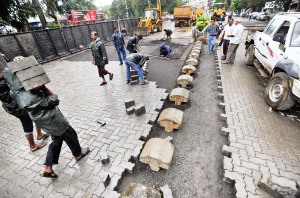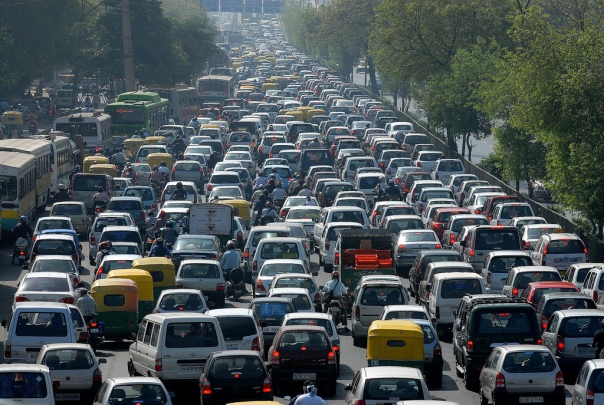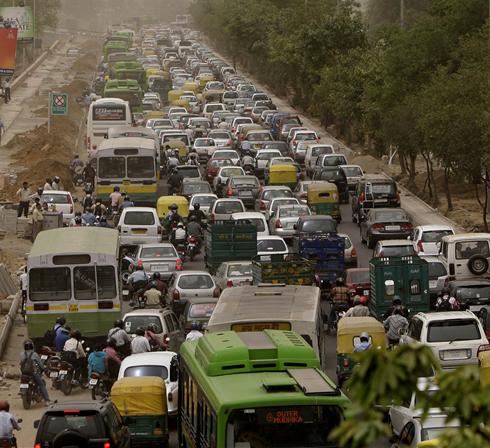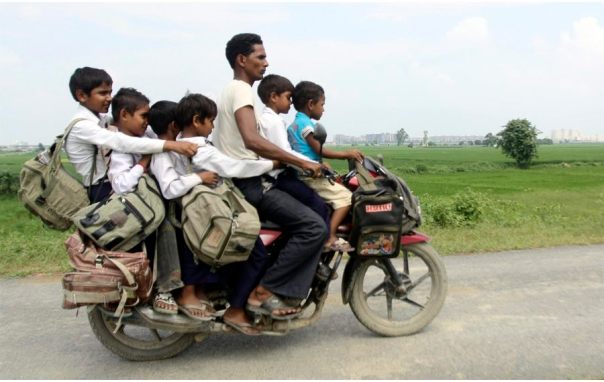Category Archives: Condition of India Roads
Eliminating the inconvenience caused due to poorly scheduled road repair work.

A lot of roads in Mumbai have been in very bad shape and the only thing worse than them is the repair work undertaken for the same by the BMC moving at snails pace and causing inconvenience to everyone. Often the road repair work isn’t optimally scheduled causing unending jams and inconvenience to commuters and road users. In some cases, work that be completed quickly if done at a stretch is distributed over a number of days. With the BMC planning a mega block for road repairs on the lines of ones undertaken by Railways, the matters are only expected to get worse.
Ideally repair work should be scheduled at non peak hours or during the time of the day when the vehicular flow is minimum. When limited amount of work is involved, road repair should be taken up at night time to ensure smooth completion and least inconvenience to the citizens and road users. If a substantial amount of work is to be done, it should be done round the clock at a stretch rather than distributing the same over longer intervals.
We are taking up the issue with the government authorities and the law enforcement agencies directly and also shall request media to help create awareness and pressure on the authorities. We look forward to your suggestion and support to take up better governance.
You can send your suggestions to info@theroadtochange.org.in
My journey to “The Road To Change”
In 1997, I decided to travel to Europe with my family. As I was planning for the tour, I thought it would be great fun, if I drove around Europe myself, instead of traveling by public transport. At that time, I had driven Maruti, Ambassador and Fiat cars in India, and had very little experience of driving mid-size cars. Some of my friends advised I not drive in Europe. In fact, one of my friends told me that on the expressway in Germany, people drive at a speed of over 150kmph and if I don’t cope up with the speed, I might meet with an accident. However, I decided to take the risk and went ahead to experience driving in Europe myself.
We hired a car from Zurich for 15 days and on the very first day, we traveled almost 400 miles! We reached Salzburg in Austria, without any problem, although I was driving an Opal Astra for the first time. I never had to honk, as there was no need. I found people very disciplined, while driving. Not just that, pedestrians only used footpaths. People had the courtesy toward pedestrians and fellow drivers on the road. There were no irregular pedestrian crossings, as there were either over bridges or subways.
You may think it is difficult to drive in Europe, because all cars have a left-hand drive and unlike India, you have to drive on the right hand side of the road. But to my astonishment, everything on the road was so disciplined, that I never faced any problem. There was a huge difference between what we see in India and what I experienced in Europe.
I, then, thought that when I get back to India, I will take up an initiative to create awareness of disciplined driving for a safe India.
Later, I visited London and observed that rather than enforcement of rules and regulations, people were self-disciplined on the road. One of my friends drove me all over London. One day, he told me that he would take us to the River Thames at midnight. We reached the river bank at 2am. The road, next to the river bank, had 5 lanes and there was no traffic at all, at that time. He told me to take a stroll at the river bank and he would join us after parking the car, as there is no parking allowed on the road sides. A typical Indian, I told him, 典here is no traffic at all now. Why don’t you park the car near the footpath and join us?But he refused at first. However, on my insistence, he agreed and parked the car at the side of the road. Believe me, even before he could get out of the car, a policeman came and told him that he cannot park here. There was no discussion or argument or even a request to allow him to park, as it was not disturbing anyone and was only for half an hour. The rules are that strict. My friend had to, ultimately, park the car in a parking lot.
It was really a pleasant surprise, that the ordinary citizens and the law enforcement officials are so disciplined on the road.
My 15 days experience in Europe and London led me to initiate a road safety project in India. I feel it’s our responsibility to make a better society and not just curse the nation for what it does not have.
How can we save those on the roads?
I have been discussing this with almost everybody. People like me, who face terrible traffic jams in the city. They are fed up and so am I. But I don’t want to give up on this problem. It is something we all need to solve.

I have thought about a few things, like going and meeting NGOs and private companies and asking them to come together and form groups, to tackle this problem.
Individuals, who want to help solve traffic-related problem, can join these special groups and sketch out different methods and ways to tackle the problem.
Actually traffic jams are just one small part of the current traffic situation. There are bigger problems related to it – road rage is one of the most crucial of those.
Traffic jams lead to road congestions, which tempt people to break traffic rules to escape the situation. This, in turn, makes people overtake from the wrong side, upsetting drivers, who do not break rules and follow road safety norms. This leads to frustration & anger and ends up as road rage, which can be dangerous, often causing accidents, and sometimes proving fatal.
So you see, there is loss to property, loss of mental health and sometimes life. Other problems like noise pollution, air pollution, wastage of petrol, parking problems, etc. are also there.
In the given situation, driving on the roads is almost a curse.
But, we can change this situation, if we make some efforts and take some steps in this direction.
Good traffic law enforcement is essential for road safety. People need to be taught discipline. They need to obey/follow traffic rules for road safety. Traffic policing is important for a safe and efficient movement of traffic. This can be achieved by persuasion, prevention and punishment. People need to be disciplined; the ones, who do not follow traffic rules, need to be penalized. Right laws put into practice will change behavior.
Speed limits will reduce accidents. Better movement of cars will ensure peaceful ways of driving.
Indian Road Accidents
Despite just 1.5% of the world’s vehicle population, India manages to top world road accident charts with a disturbing 10% of all road-accidents! And this is a result of the lawlessness that prevails on our roads. Both from the authorities, and the people; road-ethics are ditched in favor of ‘short-cuts’, impatient behavior, and convenience. Its an extremely grim scenario, and one that needs urgent & crucial attention.
The fact of the matter is, nowhere is it safe on Indian roads. Be it the rural areas, our big cities, not even national highways. Everyone, on all types of roads, is constantly vulnerable to road accidents, that are in many cases, lethal! Such is the adverse impact of road-accidents, that the WHO estimates this menace to become the 3rd largest cause of injury, and the 6th largest cause of death, by 2020.
No user type is spared. Each road user type is subject to fatalities and the figures tell a rather bleak story. Topping the list are two-wheelers with 22%. Next up we have Cars/Taxis and Trucks with 13% & 11% respectively. And the scariest part, owing to a general lack of civic sense on our roads, even pedestrians are faced with road-accident fatalities amounting to 13%!
But while figures tell one side of the story, it is actual recorded incidents that portray the complete horror of loss of lives on our roads. With this are three such videos that encapsulate the extent of road-accident tragedies to some degree. In the first video, a sleepy part of Kerela witnesses an accident in broad day-light. The reason, an unmanned junction that the police seems to have ignored, and the civilian population is too callus to be careful about.
In the second video, we hear about the devastating end of a would-be pedestrian lady, that too in the nation’s capital no less, who has been marooned to death by large commercial vehicles reportedly continually driving over her! And the 3rd video tells the case of a happy holiday group, who crash to their deaths out on the open highway!
Is really no place safe? No one secure? Some serious thought is solicited by the dismal state of our roads & the impending calamities across them. Its high time, for a road to change!
TERROR INDIAN ROADS
Despite having the world’s second largest roads network of 3.2 million kilometers; the condition of Indian roads is appalling. Burdened with the responsibility of 70% of the country’s freight & cargo,and an astonishingly high 85% of the nation’s traffic; the roads are far from safe. They are in urgent need of attention, quality-control, and safety regulation.
The accidents that take place on an alarmingly high rate on our roads spell some very scary figures.For instance, Personal Injuries sustained across Indian roads occur too frequently. The number of fatal road accidents in India is 1.8 lakh every year and increasing. Further, 350 people die &7000 people are injured everyday due to road accidents. That translates to 1,27,750 and 25,55,000 each year respectively. The ratio of Injured to Killed 1: 20. The most disillusioning part, more than half these fatalities are of people between the ages of 15 & 44 years, making them the family bread winners!

Aside from the unquantifiable emotional loss owing to people-related accidents, the sorry state of the road network also witnesses a huge amount of monetary losses. Traffic snarls, a common occurrence across towns & cities in India, causes loss of productivity. The loss of man hours and productivity runs into thousands of crores of rupees. The loss in GDP is estimated at Rs 75000 crores, being 1% of the GDP of India!
The road network conditions have reached a critical breaking point. Cities are swelling with traffic, inter-city roads are do not see proper up keep and have increasing accidents, both personal & property, and our dependence on the road network itself, for lack of other robust & efficient transport systems, despite ironically having the world’s largest rail-network; are all causes for grave concern.
One never feels safe. Be it a child going to school, an elderly grandparent taking a walk on the street, a husband driving back into the city after a meeting at an off-site, or pregnant home-maker returning from her groceries shopping. Much less, if one is moving cities and is on an inter-state highway, with family, bag & baggage in tow.
We need to delve deeper into the road-conditions and take it upon ourselves to come up with an urgent & effective set of solutions, and then enforce them.

